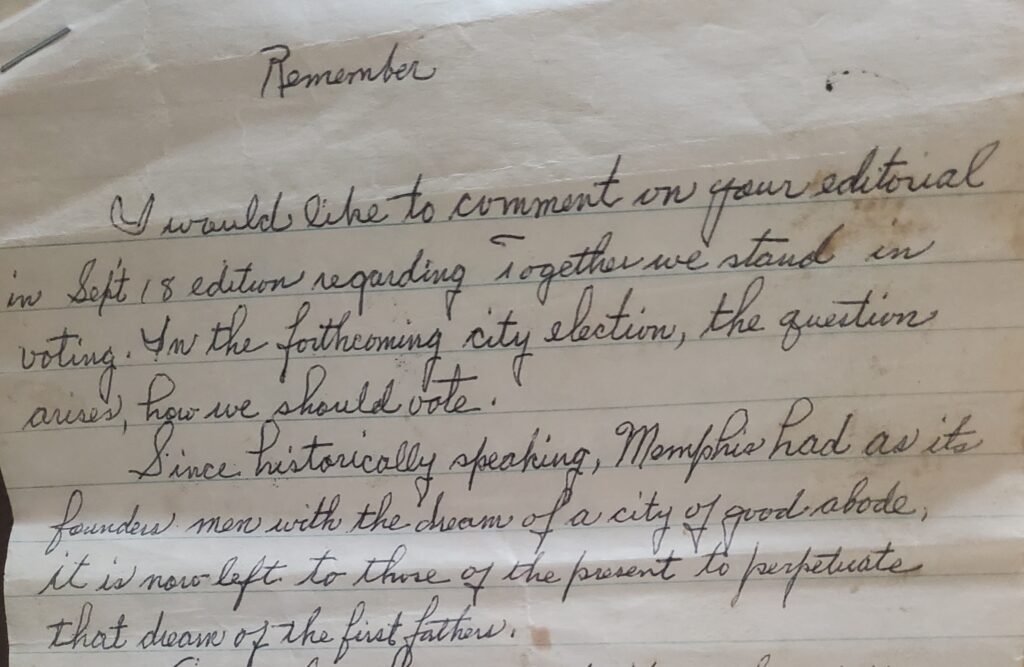Our father loved to write. We called him Dad. He served our country during WWII and after discharge; he did not receive G.I. benefits. We lived in abject poverty in the segregated South. He supported his family by working in cotton fields and as a day laborer. After moving to a military town, he was hired as a janitor on the Naval Base. Our parents insisted their five children would receive an education. We didn’t let them down!
Dad wrote whenever he could. He read the local newspapers, The Commercial Appeal or Memphis Press Scimitar, and responded to editorials. He wrote about the church, current events, politics, and Soul Music.
After Dad passed, I found many articles in his treasured military footlocker. This article is titled, Remember. Apparently, he responded to an editorial in one of the local newspapers. I decided to publish excerpts from his thoughtful and well written article. His article is copy righted and is not to be used without written consent.
Remember
By: George Hewlett, II
I would like to comment on your editorial in the September 18, edition regarding Together We Stand in Voting. In the forthcoming city election, the question arises, how we should vote?
Since historically speaking, Memphis had as its founder’s men with the dream of a city of good abode. It is now left to those of the present to perpetuate that dream of the first fathers.
Aside from being a great city on the mighty Mississippi, with its many other scenic and industrial attributes, Memphis’ history is not complete without mentioning two black men in particular, since each were outstanding in their respective fields. It was here in Memphis that Professor W.C. Handy composed and gave birth to the blues which became world renown to music lovers. We remember that Beale Street became famous largely because of his fame, the Father of the Blues.
Remember the signs men carried on their backs, “I Am a Man.” These sanitation workers marched Memphis streets for safe working conditions and better pay. This was the reason a great man, Dr. Martin Luther King Jr., came to Memphis. Voting rights was one, among many other rights, he believed all men should enjoy as citizens.
Also, we remember that Dr. King resided here for just a few days on his last mission. To him fate wasn’t kind. It was here he breathed his mortal last. Instead of a silent birth that time, it was a shocking death. What a contrast!
For the simple reason those two men, in their special way, played such a great part on focusing world attention on Memphis. It seems that fate decreed it that way-one in the musical field and the other in death.
Now, I truly agree with your editorial on voting rights. We should remember that among the many others, voting rights was also what Dr. King bled for. You mentioned that black pride has been blown up more than intended for. There is one perspective of black pride though, I believe we should remember to use. As a people it seems that at this point, one voting strategy is in a complex situation. I believe the world will want to know just how many and how a 40% percentage of people will vote here.
How we voted will only be answered after the elections. My version of black pride would be our esteem of voting rights. Who we want, what we want, and why. Can our 40% generate enough so called black votes to chart the course for a better city?
You may ask, who should we vote for? I would say any qualified man or woman who is broad enough to put principles before party and rightism before racism, be they black or white.
What we, I believe, should want is better race relations, justice and mercy in the courts, opportunities to work at and run any business we are qualified for.
Why- is because changes are needed here as well as in other places. At the present time, my nativity Mississippi, is giving the best example of togetherness of the black vote. Memphis, I believe, should want those changes because of her rich heritage, and it should now become a model to the world of human rights. Looking back will only delay those changes. Time has a way of healing all scars.
At this particular point, I believe the white and black people of true goodwill should unite in purposes for a better city. The treacherous winds now blowing, if not checked, will not only be fatal to blacks, but whites as well. Destructive purpose has no color line. All falls in its path, whether in nature or by the cruelty in men.
We should remember that we want a better city. The material aspects of life mean little unless men live beneath the wings of righteousness, where it is practiced as well as planned. We should all be thankful.
Are we men and women of good purposes of life? Let us help those men and women we truly believe meet those qualifications of willingness to promote the ideals of a model city, a place of best abode, where justice and mercy prevail. A city where the wicked will cease from troubling, and the weary will be at rest. Let us try to remember, no greater tribute could we pay to the founding city fathers, Professor Handy and Dr. King.
Francie Mae. May 27, 2024.
